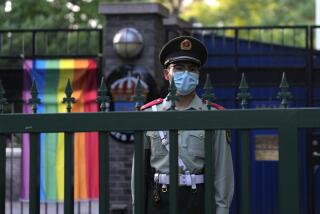How does China mark Women’s Day? Hold the feminism, bring on the fashion show
- Share via
Reporting from Beijing — The All-China Women’s Federation was founded by the Communist Party in 1949 to “protect women’s rights and interests.” But sometimes, it seems to be on the lagging, rather than leading, edge of the push for equal rights and opportunities for the female sex.
It’s been criticized for, among other things, posting advice on its website urging young women to hurry up and get married before they’re 30, and warning them that “as women age, they are worth less and less, so by the time they get their M.A. or Ph.D., they are already old, like yellowed pearls.”
The group has also suggested that women ought not “make a fuss” if their husbands have affairs.
On Monday, in the midst of China’s annual legislative session in Beijing, the group threw a reception at the Great Hall of the People. As (mostly male) delegates to China’s National People’s Congress (NPC) delivered political work reports in other rooms in the massive structure on the west side of Tiananmen Square, hundreds of Chinese women and invited female foreign guests assembled in the Grand Ballroom for an hour-long gathering to mark International Women’s Day, which is celebrated around the globe on March 8.
Hypothetically, the gathering might have been an ideal opportunity to engage in a serious dialogue on the fight for women’s rights in China. Though Chinese leaders frequently invoke Mao’s saying “women hold up half the sky,” men still dominate in politics, business and many other realms.
Instead, the event featured a fashion show, an acrobatic number called “Spring Flowers,” a serenade from a male opera singer, and two group dance numbers entitled “Paper-Cutting Girls” and “The Valentine’s Day for Tujia Girls” featuring performers twirling red umbrellas.
Only 23% of NPC delegates are women, and their representation is even lower in the Chinese People’s Political Consultative Congress (CPPCC), where 17% of delegates are women. Only two of the Politburo’s 25 members are women.
The past year has been a tough year for feminists in China: Last March, on the eve of International Women’s Day, police detained 10 female activists who were planning to hand out leaflets and stickers in several cities to focus attention on the issue of sexual harassment on subways, trains and buses.
Five of them were held for more than a month, and though they were released on bail without charges, they remain under criminal suspicion “pending additional investigation.”
Since then, the plight of the “Feminist Five” has drawn international attention. Hillary Clinton tweeted support for them. Ms. Magazine named them among the “10 Most Inspiring Feminists of 2015.” The Chinese Lawyers for Human Rights deemed their case one of the “Top 10 Chinese Human Rights Cases of 2015.” And Foreign Policy magazine chose one of the five, Li Tingting, as one of the “100 Leading Global Thinkers” last year.
Ahead of last week’s opening of China’s annual “two meetings” — the yearly sessions of the NPC and the CPPCC now in progress — lawyers for the women called on delegates to the gatherings to discuss their case, and appealed to national authorities to intervene.
“We believe the case was… a miscarriage of justice deliberately perpetrated by certain police officers and that this case has become a laughingstock outside China and tarnished the country’s image,” the lawyers wrote in an open letter to police in Beijing’s Haidian district.
(Days later, friends and family members of the attorneys said they had been visited by police and judicial officials, who questioned them over the letter.)
But there was no mention of the “Feminist Five” at Monday’s reception. Instead, attendees were invited to sip tea and eat cream cheese brownies in the large ballroom as a band played.
Shen Yueyue, president of the Women’s Federation, delivered remarks praising the “new progress in all aspects” made by the group in 2015.
The federation, she said, provided entrepreneurship training for 8 million women and helped 500,000 women set up businesses. The group also launched its “Looking for the Most Beautiful Families” campaign, which encourages “more families to practice virtuous family traditions and work together to fight corruption.”
Several invitees to the event, asked if they had ever heard of the “Feminist Five,” responded with blank looks.
“I’m not familiar with that,” said one. “Would you like some tea?”
Yingzhi Yang in The Times’ Beijing bureau contributed to this report.
Follow @JulieMakLAT for news from China
More to Read
Sign up for Essential California
The most important California stories and recommendations in your inbox every morning.
You may occasionally receive promotional content from the Los Angeles Times.











